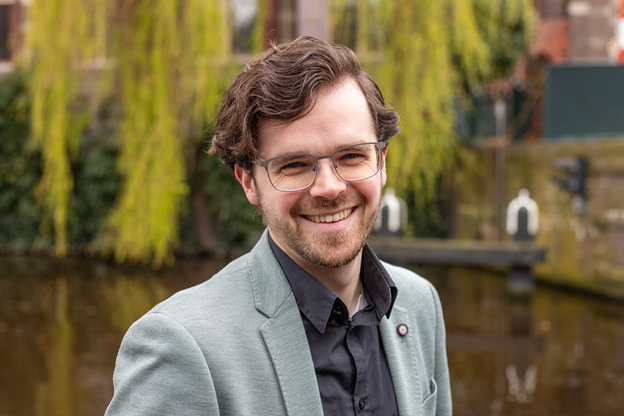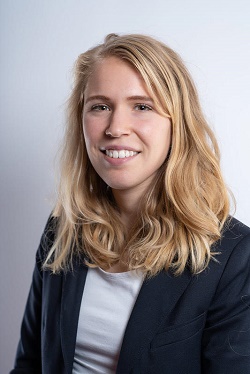
Study Econometrics, Operations Research and Actuarial Studies in Groningen and use data science to make data-driven decisions in business and society.
Specialize in one of four focused profiles:
1)
Actuarial Studies and Financial
Econometrics
focuses
on mathematical models for risk management in the financial
sector.
2)
Data Science
combines data assembly and analysis with
modeling and decision-making in the large.
3)
Econometrics
aims at quantifying causal relations among
economic variables using statistical models.
4)
Operations Research
uses mathematical and probability
models to solve optimization and decision-making
problems.
| Semesters | ||||
|---|---|---|---|---|
| CoursesCourse Catalog > | 1a | 1b | 2a | 2b |
| Data Analysis and Machine Learning (5 EC) | ||||
| Econometric Methods (5 EC) | ||||
| Non-normal Data Analysis (5 EC) | ||||
| Electives for all profiles (10 EC) | ||||
| Other quantitative courses (10 EC) | ||||
| Data-driven Optimization (5 EC) | ||||
| Econometric Tools for Data Analysis (5 EC) | ||||
| Models for Short Term Risk Management (5 EC) | ||||
| Design of Combinatorial Algorithms (5 EC) | ||||
| Networks and Spatial Economics (5 EC) | ||||
| Quantitative Finance (5 EC) | ||||
| Master's Thesis (20 EC) | ||||
| Applied Microeconometrics (5 EC) | ||||
| Banking, Insurance and Risk Management (5 EC) | ||||
| Demand Data Analysis & Inventory Control (5 EC) | ||||
| Investing, Uncertainty and Climate Risk (5 EC) | ||||
| Programme options |
|---|
| Master Internship (specialization) Many students combine the writing of their MSc EORAS thesis with an internship at a company or a (semi-)public institute such as the Dutch Central Bank. Often, these students move to the city of their internship for the duration of the internship.In case of an internship in the West of the Netherlands (known as the “Randstad”), communication between student and thesis supervisor often takes place via e.g. Skype. Many students are offered a job at the company where they have done their internship. However, it is also possible to write an MSc thesis without doing an internship, which is an attractive option for research-oriented students who wish to consider the option of doing a PhD after their MSc EORAS. |
| Double Degree Master International Business and Finance (Shanghai) (specialization) Are you interested in an international career in or involving China? Study in Shanghai after your FEB Master's programme in Groningen and gain first-hand knowledge and experience of China and the economy, finance and culture. |
| Specific requirements | More information |
|---|---|
| previous education |
To be eligible for admission to this Master, you need to hold an academic Bachelor's or Master's degree from a research university in the field of Econometrics and Operations Research. To assess whether your educational/academic background meets the specific programme requirements, we will consider the level and curriculum of your previous studies. For more information, please visit: https://www.rug.nl/feb/apply-msc. |
| other admission requirements |
The information about entry requirements is an indication of your admissibility. Every application will be reviewed individually by the Admissions board so the admission decision may differ from the indication in this table. |
| Study programme | Organization | Transition |
|---|---|---|
| Econometrics and Operations Research | Erasmus University Rotterdam | No additional requirements |
| Study programme | Organization | Transition |
|---|---|---|
| Economics and Business Economics | Maastricht University |
Via a pre-master More information:For Economics track only: You need to first complete the 60 EC Pre-Master's programme. For information about the Pre-MSc application and entry requirements, please check https://www.rug.nl/feb/premaster. |
| Business Analytics | Maastricht University |
Via a pre-master More information:You need to first complete the 60 EC Pre-Master's programme. For information about the Pre-MSc application and entry requirements, please check https://www.rug.nl/feb/premaster. |
| Econometrics and Operations Research | Maastricht University | No additional requirements |
| Study programme | Organization | Transition |
|---|---|---|
| Astronomy | University of Groningen |
Via a pre-master More information:You need to first complete the 60 EC Pre-Master's programme. For information about the Pre-MSc application and entry requirements, please check https://www.rug.nl/feb/premaster. |
| Physics | University of Groningen |
Via a pre-master More information:You need to first complete the 60 EC Pre-Master's programme. For information about the Pre-MSc application and entry requirements, please check https://www.rug.nl/feb/premaster. |
| Chemistry | University of Groningen |
Via a pre-master More information:You need to first complete the 60 EC Pre-Master's programme. For information about the Pre-MSc application and entry requirements, please check https://www.rug.nl/feb/premaster. |
| Applied Physics | University of Groningen |
Via a pre-master More information:You need to first complete the 60 EC Pre-Master's programme. For information about the Pre-MSc application and entry requirements, please check https://www.rug.nl/feb/premaster. |
| Mathematics | University of Groningen |
Via a pre-master More information:You need to first complete the 60 EC Pre-Master's programme. For information about the Pre-MSc application and entry requirements, please check https://www.rug.nl/feb/premaster. |
| Industrial Engineering and Management | University of Groningen |
Via a pre-master More information:You need to first complete the 60 EC Pre-Master's programme. For information about the Pre-MSc application and entry requirements, please check https://www.rug.nl/feb/premaster. |
| Econometrics and Operations Research | University of Groningen | No additional requirements |
| International Business | University of Groningen | No access |
| Economics and Business Economics | University of Groningen |
Via a pre-master More information:Students with a BSc E&BE (all profiles) need to have passed the course Intermediate Mathematics to have access to the Pre-Master EORAS programme that consists of 60 EC. Please check https://www.rug.nl/feb/premaster. |
| Business Administration | University of Groningen | No access |
| Artificial Intelligence | University of Groningen |
Via a pre-master More information:You need to first complete the 60 EC Pre-Master's programme. For information about the Pre-MSc application and entry requirements, please check https://www.rug.nl/feb/premaster. |
| Chemical Engineering | University of Groningen |
Via a pre-master More information:You need to first complete the 60 EC Pre-Master's programme. For information about the Pre-MSc application and entry requirements, please check https://www.rug.nl/feb/premaster. |
| Computing Science | University of Groningen |
Via a pre-master More information:You need to first complete the 60 EC Pre-Master's programme. For information about the Pre-MSc application and entry requirements, please check https://www.rug.nl/feb/premaster. |
| Applied Mathematics | University of Groningen |
Via a pre-master More information:You need to first complete the 60 EC Pre-Master's programme. For information about the Pre-MSc application and entry requirements, please check https://www.rug.nl/feb/premaster. |
| Biomedical Engineering | University of Groningen |
Via a pre-master More information:You need to first complete the 60 EC Pre-Master's programme. For information about the Pre-MSc application and entry requirements, please check https://www.rug.nl/feb/premaster. |
| Study programme | Organization | Transition |
|---|---|---|
| Economics and Business Economics | VU University Amsterdam |
Via a pre-master More information:You need to first complete the 60 EC Pre-Master's programme. For information about the Pre-MSc application and entry requirements, please check https://www.rug.nl/feb/premaster. |
| Business Analytics | VU University Amsterdam |
Via a pre-master More information:You need to first complete the 60 EC Pre-Master's programme. For information about the Pre-MSc application and entry requirements, please check https://www.rug.nl/feb/premaster. |
| Econometrics and Operations Research | VU University Amsterdam | No additional requirements |
| Study programme | Organization | Transition |
|---|---|---|
| Economie | Tilburg University |
Via a pre-master More information:You need to first complete the 60 EC Pre-Master's programme. For information about the Pre-MSc application and entry requirements, please check https://www.rug.nl/feb/premaster. |
| Econometrics and Operations Research | Tilburg University | No additional requirements |
| Study programme | Organization | Transition |
|---|---|---|
| Business Analytics | University of Amsterdam |
Via a pre-master More information:You need to first complete the 60 EC Pre-Master's programme. For information about the Pre-MSc application and entry requirements, please check https://www.rug.nl/feb/premaster. |
| Actuarial Science | University of Amsterdam | No additional requirements |
| Econometrics and Data Science | University of Amsterdam | No additional requirements |
| Study programme | Organization | Transition |
|---|---|---|
| Business Administration | Radboud University Nijmegen |
Via a pre-master More information:For Business Economics track students: You need to first complete the 60 EC Pre-Master's programme. For information about the Pre-MSc application and entry requirements, please check https://www.rug.nl/feb/premaster. Note that our deficiency programme is max. 60EC. |
Students with a Dutch diploma can apply directly to Studielink. More information on the steps to apply .
| Type of student | Deadline | Start course |
|---|---|---|
| Dutch students | 01 May 2026 | 01 September 2026 |
| 15 October 2026 | 01 February 2027 | |
| 01 May 2027 | 01 September 2027 | |
| 15 October 2027 | 01 February 2028 | |
| EU/EEA students | 01 May 2026 | 01 September 2026 |
| 15 October 2026 | 01 February 2027 | |
| 01 May 2027 | 01 September 2027 | |
| 15 October 2027 | 01 February 2028 | |
| non-EU/EEA students | 01 May 2026 | 01 September 2026 |
| 15 October 2026 | 01 February 2027 | |
| 01 May 2027 | 01 September 2027 | |
| 15 October 2027 | 01 February 2028 |
| Specific requirements | More information |
|---|---|
| previous education |
To be eligible for admission to this Master, you need to hold an academic Bachelor's or Master's degree from a research university in the field of Econometrics and Operations Research. To assess whether your educational/academic background meets the specific programme requirements, we will consider the level and curriculum of your previous studies. For more information, please visit: https://www.rug.nl/feb/apply-msc. If you have any questions concerning admission to this programme, please contact our Admissions Office: https://www.rug.nl/admissions. |
| language test |
IELTS Academic overall score 6.5 (Speaking 6, Writing 6.5); TOEFL internet-based overall score 90 (Speaking 20, Writing 24); Cambridge C1 Advanced or C2 Proficiency (overall score 176, Speaking 169, Writing 176); LanguageCert Academic: overall score 70 (min. 65 in Speaking, 70 in Writing); Pearson PTE Academic (min. 56 in Speaking, 70 in Writing). |
Students have to apply via Studielink and the Progress Portal (replacing the previous system, Online Application System OAS) of the University of Groningen. After you apply for the programme of your choice, the Admissions Office will evaluate your educational background and assess your eligibility. Your application will be assessed on an individual basis. More information on how to apply.
| Type of student | Deadline | Start course |
|---|---|---|
| Dutch students | 01 May 2026 | 01 September 2026 |
| 15 October 2026 | 01 February 2027 | |
| 01 May 2027 | 01 September 2027 | |
| 15 October 2027 | 01 February 2028 | |
| EU/EEA students | 01 May 2026 | 01 September 2026 |
| 15 October 2026 | 01 February 2027 | |
| 01 May 2027 | 01 September 2027 | |
| 15 October 2027 | 01 February 2028 | |
| non-EU/EEA students | 01 May 2026 | 01 September 2026 |
| 15 October 2026 | 01 February 2027 | |
| 01 May 2027 | 01 September 2027 | |
| 15 October 2027 | 01 February 2028 |
As a graduate, you will have access to a diverse range of challenging positions at various organizations such as banks, insurance companies, logistics firms, central banks, pension funds, consultancy firms, the government or supervisory authorities.
Organizations in both the public and the private sector will be eager to on-board you. You could also start your career as a researcher in academia or at a research institute. Our alumni work at different companies such as Achmea, Arriva, Deloitte, ASML, Belastingdienst, Riskquest, ABN AMRO, UMCG, Albert Heijn, Royal Haskoning.
We also have two research institutes related to this MSc programme:

After completing my BSc in Econometrics and Operations Research (EOR) at FEB, continuing with the EORAS master's was the obvious choice. The programme offers a great mix of practical, real-world data courses and strong technical focus, which is unique in the Netherlands. Plus, staying longer in the country’s best student city was an added bonus. I’ve always had a strong affinity for problem-solving. There’s something deeply satisfying about optimally routing a vehicle, organizing stock, or using real data to make sound decisions. The EORAS programme gave me the perfect platform to develop these skills in a real-world context.
The atmosphere within the programme is incredibly open and inviting. The staff are approachable, and while students are motivated to work hard, there’s also a strong social element. Vesting, the student association, plays a huge role in bringing everyone together, which I really appreciated.
I’m currently working as a Head of the Energy Department at Seatrade, a global shipping company, where I lead a team that is responsible for managing and analyzing energy and emissions data. We also develop software to make this data accessible for all employees and advise the management on strategic decisions. The technical focus of the EORAS programme, especially in analyzing complex systems, has been invaluable in my consultancy work. Programming and statistical analysis are part of my daily routine, and the ability to break down large, complex systems is something that really sets EORAS graduates apart.
My advice to current EORAS students? Relax a little and focus on the problems you find interesting. It’s easy to feel pressure when you’re surrounded by the best of the best, but once you enter the corporate world, you’ll realize that you’re well-equipped to handle the challenges. Especially if you’re working in a field you’re passionate about.

During the uncertain times of the pandemic, I decided to stay in Groningen, and it turned out to be a fantastic choice! The MSc EORAS programme allowed me to dive deep into theoretical concepts, which I enjoy, and gave me the flexibility to pursue a dual degree with the MSc in Finance, an opportunity that not many universities offer.
The number of students doing the MSc EORAS is quite low, which means that it is an open atmosphere in which it is easy to ask questions, participate actively and get a lot of attention in case you struggle with a topic. This makes it easy to learn a lot if you put in the effort, and also makes it easy to get to know a lot of fellow student, which makes studying more enjoyable of course.
I now work at Milliman, which is a small firm operating in the insurance sector. My role is varied, involving the development of valuation and risk models, and applying econometric techniques I learned during my studies. I did the Actuarial Studies profile and I work in the insurance sector now, which is why I still apply these techniques a lot. The skills I gained—especially problem-solving and programming—are invaluable to my daily work.
To current MSc EORAS students, I’d say: take your time. Explore the opportunities, whether by tackling multiple specializations or combining it with another programme at FEB. Groningen offers an ideal place to grow academically while enjoying a vibrant student life.

Did you know you can follow an economics programme in Groningen? Find out more about our MSc Economics.